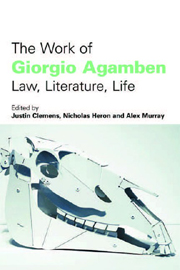Book contents
- Frontmatter
- Contents
- Acknowledgements
- Notes on Contributors
- The Enigma of Giorgio Agamben
- 1 K
- 2 Integral Actuality: On Giorgio Agamben's Idea of Prose
- 3 The Role of the Shifter and the Problem of Reference in Giorgio Agamben
- 4 ‘Its Silent Working was a Delusion’
- 5 Politics and Poetics of Divine Violence: On a Figure in Giorgio Agamben and Walter Benjamin
- 6 Idea of Poetry, Idea of Prose
- 7 The Fading Memory of Homo non Sacer
- 8 Soulblind, or On Profanation
- 9 Face to Face with Agamben; or, the Other in Love
- 10 Beyond Spectacle and the Image: the Poetics of Guy Debord and Agamben
- 11 Dismantling Theatricality: Aesthetics of Bare Life
- 12 Notes on Media and Biopolitics: ‘Notes on Gesture’
- Index
8 - Soulblind, or On Profanation
Published online by Cambridge University Press: 12 September 2012
- Frontmatter
- Contents
- Acknowledgements
- Notes on Contributors
- The Enigma of Giorgio Agamben
- 1 K
- 2 Integral Actuality: On Giorgio Agamben's Idea of Prose
- 3 The Role of the Shifter and the Problem of Reference in Giorgio Agamben
- 4 ‘Its Silent Working was a Delusion’
- 5 Politics and Poetics of Divine Violence: On a Figure in Giorgio Agamben and Walter Benjamin
- 6 Idea of Poetry, Idea of Prose
- 7 The Fading Memory of Homo non Sacer
- 8 Soulblind, or On Profanation
- 9 Face to Face with Agamben; or, the Other in Love
- 10 Beyond Spectacle and the Image: the Poetics of Guy Debord and Agamben
- 11 Dismantling Theatricality: Aesthetics of Bare Life
- 12 Notes on Media and Biopolitics: ‘Notes on Gesture’
- Index
Summary
The more closely you look at a word, the more distantly it looks back.
Karl KrausAt stake: eu-daimonia, happiness. To traverse the juridico-political and theological model of a theocracy still prevalent today what is most in need of separation is the order of happiness from the order of the messianic. A profane experience of happiness (not conceived psychologically or transcendentally) may lie in the word. Working towards the conception of a profane historical order Walter Benjamin diagnosed as the condition of his time what seems to be still at stake today: the redemption of the mode of transmission of things that are held as ‘sacred heritage’: the hypocrisy of ‘the closed mouth’ as a place of authority, that reigns but does not govern. Redemption here refers not to the saving of the past, but the saving of what never was: the new, our ever infant form of being. Whereas politician-vicars of all kinds wish to consign desire to this or that silent topos, what is most needed as a radical praxis is to recall arguments, ideas and desires, the flesh of things to experience (an experimentum). It is the undecidability between the lived experience and the poietic life that defines the event of experience as taking place in between, in fable. It is in fable where the wild things are. It is not recognition any longer that ‘saves us’, but the realisation that we cannot recognise ourselves in any saviour-sign, let alone return to it.
- Type
- Chapter
- Information
- The Work of Giorgio AgambenLaw Literature Life, pp. 132 - 148Publisher: Edinburgh University PressPrint publication year: 2008



